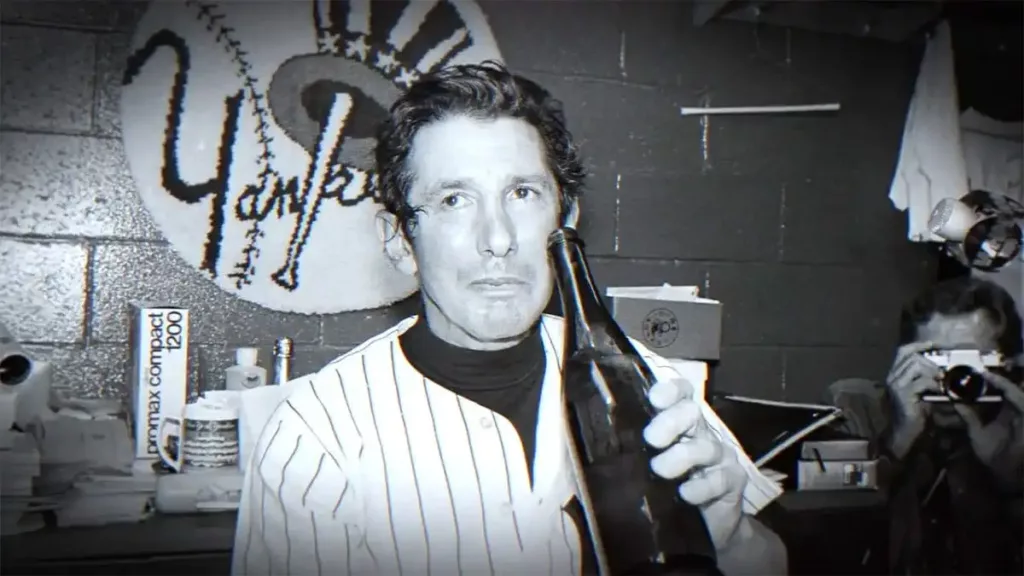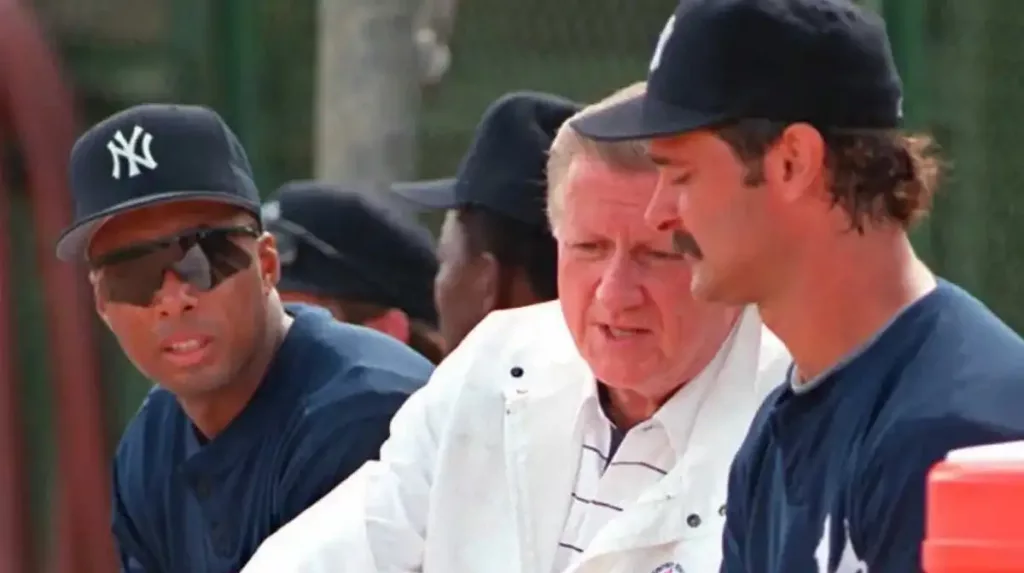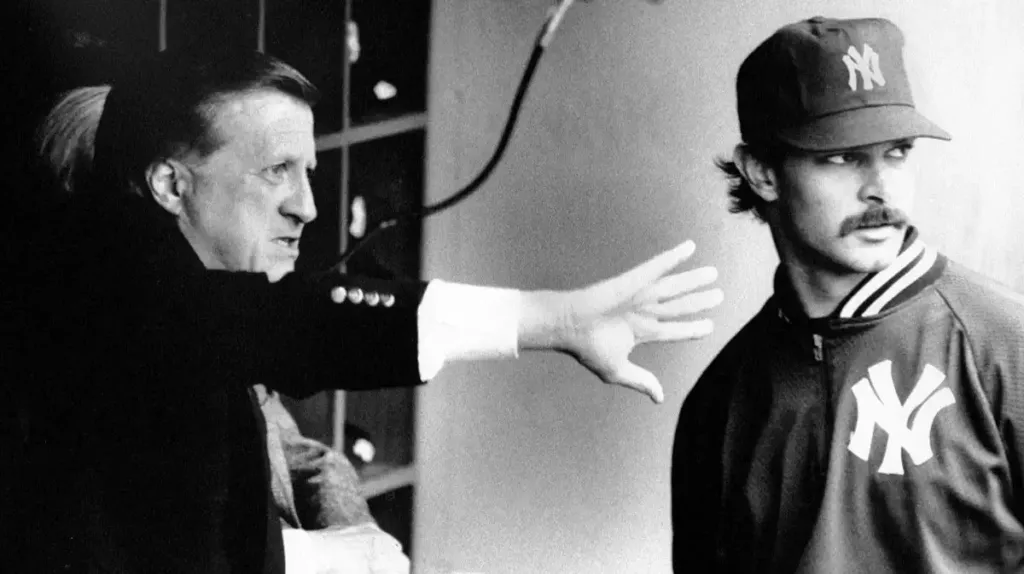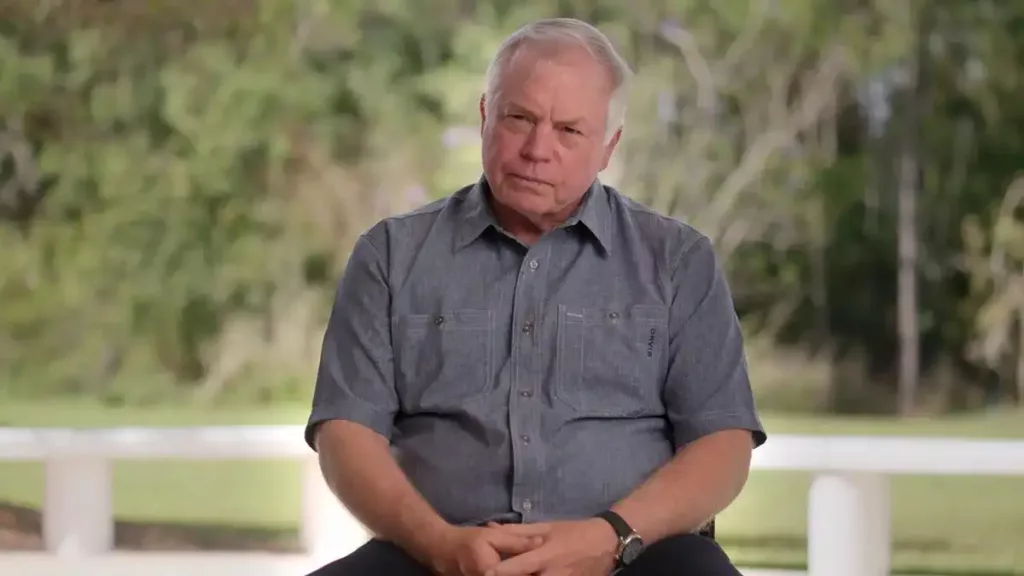The 1990 New York Yankees certainly lived up to their “Bronx Zoo” moniker that season. Between the dysfunction in the front office, turmoil on the roster, and scandals penetrating the clubhouse, it was mayhem nearly every day at Yankee Stadium. Yet amongst the unmitigated chaos, the storied franchise was fighting to avoid the embarrassment of a last-place finish.
Of course, owner George Steinbrenner was always front and center of the drama. His bitter, decade-long feud with star outfielder Dave Winfield had reached a boiling point. Meanwhile, a power struggle was unfolding as Steinbrenner grew more erratic in his decision-making. Issues came to a head when it was revealed the owner had enlisted a shady character to dig up dirt on his enemies. This conspiracy would result in Steinbrenner’s suspension from baseball for two years.
On the field, the ’90 Yankees proved utterly hapless. They lost more games that season than in any year since 1912. Free agent signings flopped while injuries ravaged the roster. Even disappointments took on absurd dimensions, like when Andy Hawkins tossed a no-hitter yet lost 4-0.
Lurking beneath the incompetence, though, were more unseemly affairs. Outfielder Mel Hall brought cougar cubs to the clubhouse and had a disturbing relationship with a 15-year-old girl. His troubling behavior was just the tip of the iceberg in a season that plunged the iconic New York club to new lows.
Through it all, the team struggled simply to preserve a shred of dignity. But their travails in that chaotic year would come to define the franchise, for better or worse, in the decades to follow.
DOWN, BUT NOT OUT
The 1990 season was truly one to forget for the New York Yankees. On the field, the Bronx Bombers faced an epic struggle. They lost an astounding 95 games that year, finishing in last place in the AL East division with a dismal record of 67 wins and 95 losses. It marked their worst season in over 75 years and only added to the turmoil.
To make matters worse, several big moves failed to pay off. The signing of flashy two-sport star Deion Sanders drew headlines, but he proved an offensive liability. Acquired to help fill the void left by Dave Winfield, Sanders hit just.182 in 53 games. Cuban hurler Pascual Perez also fizzled after blowing out his arm just a few starts into the year.
The losses piled up in bizarre fashion too. Andy Hawkins notoriously tossed a no-hitter against the White Sox, yet the Yankees still lost 4-0 after committing four errors behind him! It summed up their hapless state.
Off the field, controversy swirled. Owner George Steinbrenner was embroiled in an ugly legal battle with star outfielder Dave Winfield over alleged finances. Steinbrenner’s hire of a known gambler to dig up dirt on Winfield crossed the line. He was subsequently suspended from baseball for two years by Commissioner Fay Vincent.
In the clubhouse, further disarray emerged. Outfielder Mel Hall shocked teammates when he brought cougars to hangouts. More disturbingly, he brazenly dated a 15-year-old girl for months without the team’s awareness. His actions would later land him in prison.
It all culminated in a last-place finish and the end of Steinbrenner’s direct involvement for years. Rock Bottom was hit in 1990 for the proud Yankees franchise. But in the ashes of failure, they would find the motivation to rise again as champions.
Quality Storytelling Despite Complex Subjects
Director DJ Caruso had no easy task in bringing the chaotic story of the 1990 Yankees to screen. With countless subplots and controversies to delve into, keeping viewers engaged over three episodes must have been a challenge. Yet Caruso demonstrates skillful direction, navigating this mess of a season in an immersive and entertaining way.
He secures interviews with a wealth of key figures, from players and coaches to reporters who have observed events unfold. Seeing events dialogued out enhances understanding. Archive footage further enriches the tale. Through these assets, Caruso transports us back to 1990.
Pacing is another highlight. Jumping rapidly between characters and incidents maintains energy. Critics found this “overproduced,” but it works, mirroring the fast-moving chaos. Subplots like Pascual Perez’s struggles or Deion Sanders’ brief stint are woven in neatly.
Handling sensitive topics like Mel Hall’s case required special care. Providing his and victim Chaz Easterly’s perspectives was bravely done, avoiding sensationalism. Their comments bring a human element while respecting trauma.
Later, critics aim for valid points around addressing racism and power dynamics more substantively. Yet, given constraints, Caruso told the story respectfully and without accusation. Further discussions could have depth but may not have been possible within this format.
Overall, DJ Caruso navigates complex waters impressively. Quality production and storytelling shine through, captivating audiences with this tumultuous season in sports history. Sensitivities were addressed with care. While not perfect, this documentary brings the bizarre world of the 1990 Yankees to vivid life.
Leading Voices of a Tumultuous Season
Few figures loomed larger over the 1990 Yankees than George Steinbrenner. As owner, he was renowned for his win-at-all-costs drive but also for hasty judgments that disrupted stability. Former assistant Brian Cashman provides invaluable context, outlining Steinbrenner’s micromanaging and how free agents viewed it warily.
Steinbrenner’s infamous feud with Dave Winfield Simmers beneath the surface, though voices like Cashman and Sherman offer balanced outlooks on both sides. Their observations convey Steinbrenner’s passion but also its destructive elements, contextualizing his suspension.
For players, Don Mattingly offers a calm, principled perspective. As one of the era’s finest, he faced immense pressure but kept his head. Others, like Steve Sax, exhibit humor about antics while acknowledging deeper issues. Their recollections put a human face on difficulties, showing perseverance.
In the media, Joel Sherman has unprecedented access. His columns sparked this project, and he contributes greatly. Rosanna Scotto also lived through these events, imbuing recollections with the locality’s flavor. Their words transport us as few others’, giving us the sense of being there.
Few endured greater pain than Chaz Easterly. Yet her advocacy has been an inspiration. Willing to revisit trauma, she works to establish safety for all. Though scars remain, her progress highlights the dignity, courage, and hope that always emerge, even from life’s darkest passages.
Together, these key voices ensure varied angles and balanced portrayals. Their distinct roles offer fuller context, from locker room to press box to home. In lending humanity and wisdom to a complex season, they do honor to all affected and remind us that understanding grows through open and empathetic dialogue.
Perspectives Shaped by Scandal
The turbulent events of 1990 shook the Yankees from top to bottom. Yet beyond singular achievements lies a deeper context shaping the franchise’s journey.
Steinbrenner’s suspension proved a turning point and catalyst for change, which many felt was overdue. Where bombast and micromanaging inflamed tensions for years, the post-’90 front office prioritized stability. Gene Michael and Buck Showalter instilled professionalism, treating players as partners in a shared mission. That approach bore fruit when the championships arrived.
Yet dismissing Steinbrenner as the sole culprit reduces complexity. As reporters like Sherman note, issues like rotting infrastructure and laissez-faire contracts predated 1990. And while stable leadership helped, macro shifts also aided renewal, like baseball’s steroid-era inflating offense. Context matters for discerning varied influences.
Parallels to scandal-ridden teams remind us how far the Yankees have come, but also how far others still must travel. Like the 1980s Hurricane Doc shows, dysfunction stems from cultural problems demanding nuanced solutions. Where some franchises never recovered their reputations or prominence, the Yankees offer hope that change remains possible through openness, accountability, and community-focused reforms.
Though dark events cloud memories of 1990, their legacy also illuminates. By addressing wrongs frankly while celebrating resilience of spirit, the Yankees signal how organizations might transform trauma into purpose. In committing to justice, care, and cooperation as fixtures of their identity, they set an example of healing and redemption through honest reckoning with history—a gift benefiting players and fans alike.
Evaluating Entertainment and Impact
So in the end, does Bronx Zoo ’90 deliver as a documentary? On the whole, I’d say it largely succeeds. DJ Caruso keeps things engaging with a brisk pace that ensures no moment drags. From Steinbrenner’s controversies to characters like Hall, unfamiliar names jump off the screen in a way that stirred my curiosity.
At the same time, some depth could have strengthened certain elements. At points, the program seems almost uncomfortable dwelling on Hall’s wrongs. Discussing darkness is needed to understand change, but perhaps brevity may have spared hard-to-hear truths from reduced impact.
Still, one comes away realizing how far the Yankees have come. We see the first steps shaping future glory, with new leadership learning from mistakes. There are lessons in fallibility, persistence, and taking the long view.
The goal of spotlighting an oft-forgotten season is met. Even casual fans glimpse a fresh facet of a storied franchise. For those who lived it, nostalgia mixes with fresh lenses on past events.
In the end, I’d recommend it. The blemishes don’t outweigh engaging storytelling and cultural insight. Not every work will solve all problems, but meaningful dialogue is a start. For sports history buffs and Yankee devotees especially, these glimpses into resilience, redemption, and renewal are worth experiencing.
Redemption Through Difficult Reflection
Examining a tale like the 1990 Yankees reminds us that sports aren’t defined solely by wins and stats. Bronz Zoo ’90 offered an unflinching look at scandal, yet also conveyed the human resilience that makes compelling stories.
While focusing meaningfully on the pain inflicted, the documentary showed how addressing darkness can nurture growth. Perhaps only by confronting hard truths about the past can we progress in a spirit of understanding. Though justice wasn’t fully achieved, depicting injustice fosters dialogue where silence prevails.
The series also signified redemption through its depiction of the franchise navigating unimaginable lows to construct future excellence. Witnessing such a downtrodden team’s determination strengthened my own when faced with difficulties. Their perseverance exemplifies what makes sports engrossing: will, character, and community conquering all.
Ultimately, Bronz Zoo ’90 powerfully affirmed the merits of documenting new angles beyond triumph. Its unvarnished and caring portrayal highlighted lessons that uplift without ignoring bleakness. The redemptive message was that even rocky roads can lead somewhere better when honesty, empathy, and tenacity light the way. Perhaps most vitally, it proves the potential of sharing challenging histories to prevent repetition and honor truth.
While its subject was a single season, the mini-series’ impact stemmed from reflecting a community and human nature. Perhaps its most invaluable act was reminding us of sports’ ability to mirror society, for better or worse, at any point in time. A fitting lesson as we continue striving to build a future reflecting
all of our highest ideals.
The Review
Bronx Zoo '90: Crime, Chaos and Baseball
In summary, Bronx Zoo '90 tells a compelling true story with some missed opportunities but overall succeeds in bringing a fascinating yet deeply flawed chapter of sports history to light. While a more nuanced exploration of certain issues may have strengthened certain elements, the documentary engages and informs on key cultural events through its unvarnished yet empathetic storytelling.
PROS
- Provides an unprecedented behind-the-scenes look at one of the darkest periods in Yankee history
- Features insightful interviews from those who experienced the events firsthand
- Captures riveting cultural moments and colorful personalities that shaped the franchise
- Sheds light on issues of accountability and misconduct that were overlooked at the time
CONS
- At times, it feels rushed and could have delved deeper into certain storylines
- Does not adequately address the racial dynamics at play
- Includes an unnecessary jailhouse interview that provides little value






















































Discussion about this post